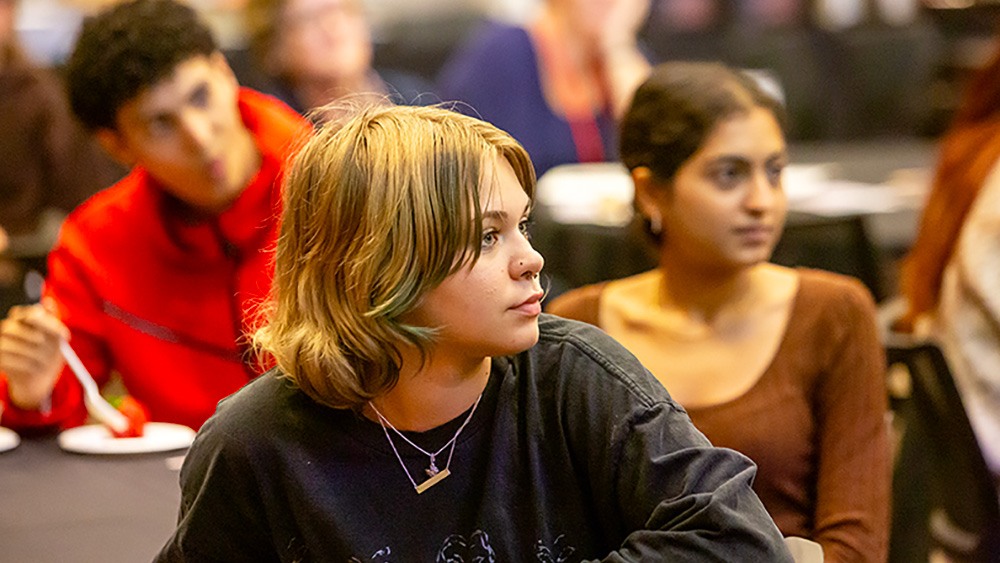Loyola University > School of Nursing > About > News and Events > Newsroom > Archive
Archive
Challenging the status quo

Students listen to a discussion on Jesuit values and equity during the Marcella Niehoff School of Nursing's first Inclusive Excellence Day.
How can nurses best treat patients from marginalized groups—Black, Brown, LGBTQIA+, or those with disabilities? And how can educators better prepare the next generation of nurses to do so?
Those were among the topics discussed at the Loyola University Chicago Marcella Niehoff School of Nursing’s inaugural Inclusive Excellence Day, held Sept. 26 at the Lake Shore Campus Damen Center. Attended by faculty, staff, and students, the event focused on how the nursing profession can promote health equity among historically oppressed populations.
It also sought to give nurses tools to recognize the impact of social determinants of health—the non-medical factors like poverty or education that impact well-being—and be advocates for their patients’ health, dignity, and access to care.
“Nursing education provides a unique opportunity to challenge and change the status quo,” said Dian Squire, PhD, founding associate dean of inclusive excellence at Loyola Nursing.
“Nurses have a powerful voice within healthcare systems,” he added, “and it is crucial that they use it to address systemic injustices that perpetuate health disparities.”
Inclusive Excellence Day will be held annually. Participants in this year’s event came from Loyola Nursing and other schools within Loyola University Chicago, as well as Rush University and other area nursing schools.
Sessions focused on equity at the intersection of Jesuit values and inclusive excellence; bystander intervention training; and providing affirming care to the LGBTQIA+ community. A nurse researcher performed spoken word poetry to demonstrate how nontraditional learning tools can humanize the experiences of those who experience discrimination.
Keynote speaker Felesia Bowen, PhD, DNP, ARNP, FAAN, associate dean for diversity, equity, and inclusion at the University of Alabama at Birmingham, spoke on “Proactive Interventions for Vulnerable Children and Their Families with a Schema of Toxic Stress,” noting the strong connection between racism and severe distress in children. Long-term, sustained stress can alter DNA and cause serious lifelong health consequences, she said.
Nurses can help by learning to recognize and treat the underlying causes of poor well-being connected to social determinants of health. Most importantly, Bowen said, nurses can vote.
“Remember: We are speaking for those who do not have a voice,” she said, adding that Loyola Nursing is expanding its inclusive excellence work at a time when some institutions are scaling back those efforts.
The daylong event highlighted the growth of Loyola Nursing’s Inclusive Excellence initiative, started in 2021. Within higher education, inclusive excellence refers to an institution’s ability to value and engage the diversity of its community and promote success among students from all backgrounds.
The School of Nursing aspires to become a national leader for inclusive excellence and anti-racism in nursing education and has taken steps to increase its support of diverse faculty and students. Among them is the creation of the CARE (Collaboration, Access, Resources, and Equity) Pathway to the Bachelor of Science in Nursing, which provides holistic support to Black and Latinx students.
The CARE Pathway team received Loyola’s inaugural READI (Racial Justice, Equity, Anti-racism, Diversity, and Inclusion) Catalyst Award from the Office of Institutional Diversity, Equity, and Inclusion in May 2023.
Dean Lorna Finnegan said she is proud the school has embraced the difficult work of building a more just society. She linked that effort to Loyola Nursing’s relationship-centered approach to nursing education and patient care.
“Central to building relationships is our commitment to inclusive excellence—a call to address diversity, equity, inclusion, and antiracism as critical building blocks to achieving and maintaining excellence,” she said.